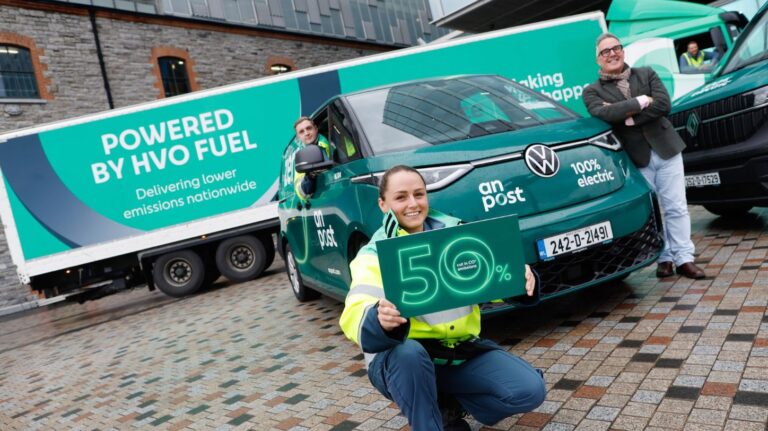Irish postal service provider, An Post, has achieved a 50% reduction in carbon emissions three months ahead of schedule.
The semi-state-owned company was originally targeting a 50% reduction in CO2 emissions reduction by 2030. However, in 2021 it brought this deadline forward to the end of 2025, “reflecting the urgency of delivering climate action and demonstrating its commitment to pursuing Ireland’s sustainability goals”.
Supported by an £87 million investment in decarbonisation, more than half of An Post’s delivery routes are now electrified and 95% of its heavy goods vehicles operate using Hydrotreated Vegetable Oil (HVO) fuel. The company also powers most of its buildings using green energy.
Commenting on the recent milestone, Ireland’s minister for culture, communications and sport, Patrick O’Donovan said: “I am delighted An Post has reached such a significant milestone and is using its growing electric fleet to drive delivery of parcels, letters and transformative change in environmental sustainability on the path to net zero.”
Reportedly, the company is now one of the largest electric vehicle operators per capita in the world.
“There is currently one EV for every 2,700 people in Ireland, and An Post is ranked amongst the top five global postal companies for sustainability, positioning it as a leader in decarbonised logistics and a model for public-sector transformation,” stated Owen Keogh, An Post’s head of sustainability.
“Our experience with EVs has been exceptional with 50% fewer breakdowns and reduced mechanical interventions compared to diesel vehicles,” he added.
Looking ahead, An Post’s next target is to achieve net zero by 2030.
David McRedmond, CEO at An Post remarked: “At An Post our commitment to sustainability is real. We are building a cleaner, more resilient logistics network for decades to come.”
“Achieving the first of our targets gives us renewed confidence that we will also achieve this goal on time with more EVs, renewable fuel and energy,” McRedmond concluded.
An Post has seen the number of parcels it delivers treble since 2009, reaching 78 million in 2025.







